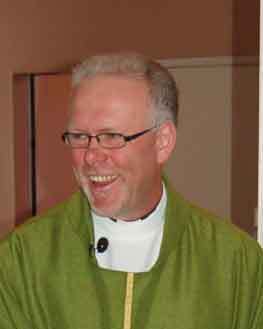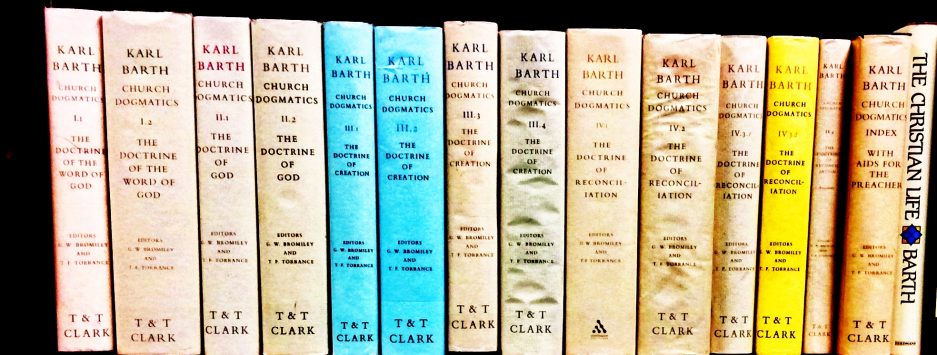This is the second in my series of posts reflecting on 10 years of our little Barth group held in Caronport, Saskatchewan! This one is compliments of Allen Doerksen.

1) Who are you? When did you attend the Barth group? And what are you doing right now in terms of vocation, family, church, etc.?
My name is Allen Doerksen. My involvement in the Barth reading group began in the second year (2006?) of its existence and ended, best I can remember sometime in 2010. I was, at the time co-Rector of St. Aidan Anglican Church, Moose Jaw with the Rev. Denise Doerksen, my wife and co-laborer in the gospel. Presently I’m the Priest-in-Charge (Vicar) of a mission parish (supported by diocesan funds), St. Matthew Anglican, Abbotsford (Diocese of New Westminster). Denise and I have three grown sons, one married and one engaged, but, sadly, still no grandchildren! By the time I had joined the group I’d been reading Barth for years but it was an enriching experience to read him with “newbies” and “steady hands,” insights came from all angles!
2) What would you entitle your blog post?
Lingering in the Presence of God’s Beauty
3) So far, do you have a favorite section of the Church Dogmatics? Why? Share one or two sentences from that section.
The Anglican imaginery is cut from both pre and post-reformation structures and thinking. The section that is my favorite thus falls in Church Dogmatics II/1 650ff., Barth’s discussion of “beauty,” something Barth notes is not discussed in any satisfactory way in the post-reformation traditions. Barth thus reaches back to Augustine’s famous “late have I love you, O Beauty, ever ancient, ever new,” as a touchstone. More shockingly, Barth works with Pseudo-Dionysius (as always Barth is not about to allow previous disagreements to get in the way of an important dialogue!). Barth is seeking to answer the questions, “Why is the thing revealed in the divine revelation and what is the form and nature of its revealing?” His answer: “If we can and must say that God is beautiful, to say this is to say how He enlightens and convinces and persuades us.”
Concomitantly, this means that “theology as a whole, in its parts and in their interconnexion, in its content and method….is the most beautiful of all the sciences.” This sentence finds itself in a section that both reflects on the beauty of God and is itself a beautiful piece of writing, a telling piece of “scientific” evidence in support of his method.
Beauty is not itself beautiful unless defined in terms of Triune God’s self-emptying in the Incarnation, “this work of the Son as such reveals the beauty of God in a special way and in some sense to a supreme degree.” The climax comes in one of his classic examples of dialectical theology, his commentary on Isaiah 52:2-3 which reads, “in him, there was no beauty that we should desire him!” When God reveals to us the risen Christ we are able to see the beauty of God shining out of horror! “It is the beauty which Solomon did not have but which with all his equipment he could only prophesy. It is the beauty of which we must also say that Athens with all its beautiful humanity did not have and could not prophesy it, because unlike Jerusalem it thought it had it….And can it be known except in the face of Him who Himself gives us power to know it? There is no other face of this kind….No other speaks at the same time of the human suffering of the true God and the divine glory of the true man.”
4) What are one or two things that have been impressed upon you—theologically, spiritually, pastorally, literarily, vocationally, whatever—in your reading of Karl Barth’s Church Dogmatics?
This passage is a great example of what Barth does for me; he helps me slow down and linger in the vicinity of what I might have easily missed if I was “merely” reading my Bible, or, on the other hand, more popular theology or spirituality books. Barth’s attention to the “trees” and to “forest” means that individual texts are engaged with seriously but never woodenly in a way that satisfies biblical scholars who only wield the tool of historical-critical interpretation. Barth is equally frustrating for many theologians who find him muddling around in the minutiae of scripture when they want him to be dealing with the “big issues” of the day! But I find that it is precisely this combination that helps arrests my impatient need to “get things done” e.g. a sermon or presentation. Barth is not an obfuscator, he does not dilly dally where direct statements might be more helpful, rather the “lingering in the face of God’s beauty,” serves the very purpose of theology which might be put plainly: to turn reading into prayerful reading or even discursive meditation, the kind of reading that I find bears fruit in my relationship with God and in my pastoral conversations. Lingering in the face of Beauty turns out to be an end in itself and deeply practical!
Follow Allen’s Twitter feed: @frallend
